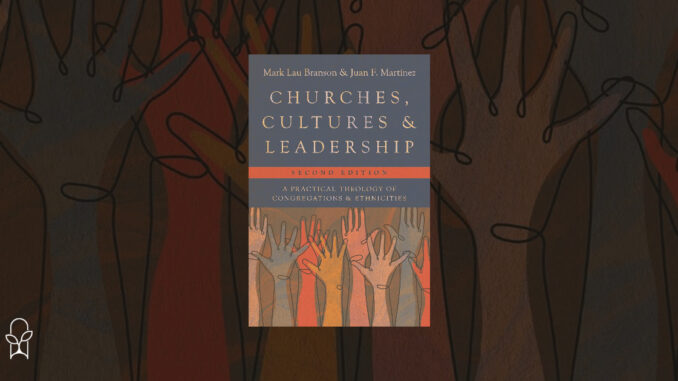
Also by this author: Leadership, God's Agency, and Disruptions: Confronting Modernity's Wager
Published by IVP Books on February 28, 2023
Genres: Academic, Non-Fiction, Christian Life, Racial Reconciliation
Buy on Amazon
Goodreads

As the church continues to hear and heed Christ's call to reflect the multiethnic character of his people, pastors and lay leaders need to gain skills and competencies to serve in those contexts. The multicultural team of Juan Martinez and Mark Branson has written this book to equip such leaders to create environments that make God's reconciling initiatives apparent in church life and in our missional engagement with neighborhoods and cities. Generated by courses they teach at Fuller Theological Seminary, Branson and Martinez take an interdisciplinary approach that integrates biblical and theological study with the disciplines of sociology, cultural anthropology and communications. The result is a rich blend of astute analysis with guidance for practical implementation of a deeper intercultural life for the church. Case studies, Bible studies and exercises for personal reflection and classroom use connect the real life and everyday challenges that inevitably arise in multi-ethnic contexts. Martinez and Branson offer not static model but a praxis of "paying attention," reflection and study that can lead to a genuine reconciliation and shared life empowered by the gospel that is personal, interpersonal, cultural and structural.
Churches, Cultures, and Leadership was originally published in 2011 by InterVarsity Press and authors Mark Lau Branson and Juan F. Martinez. The authors are both professors at Fuller Theological Seminary and have experience in cross-cultural and multicultural ministry. Branson is white, of Scots-Irish descent, and has a connection to the Asian community through his Chinese-American wife and has previously served in a primarily Black Christian college. Martinez is the Director of the Center for the Study of Hispanic Church and Community. This second edition contains updated references and stories, a reworking of the book’s structure, and the hope is for it to appeal to a new generation of pastors and seminary students. Since 2011, the United States has undergone a seismic shift in the conversation on racial justice and this new edition is meant to reflect that.
While Churches, Cultures, and Leadership is informative and comprehensive, it didn’t feel—to me—like a book written to address the current racial/cultural/ethnic trends within the church. It felt very dated in its some of its approaches and many of its anecdotes come from a previous generation. The book is structured more like textbook. Branson and Martinez have surveyed the literature—albeit older literature—well, and often reference or rely on these sources rather than bringing their own independent thoughts. This is all well and good for an academic context, but limits the accessibility in a pastoral or practical context.
Further, their content ends up being very generic. For example, in the final chapter “Leading Change,” their practical suggestions for leaders are things like “prioritize conversations,” “ask personal and family stories,” “be present and engaged in the neighborhood,” and “learn from other churches.” This advice is all well and good, but is general enough to apply to any leadership context. Individuals seeking specific advice or knowledge for a particular cultural context will not find it here. In attempting to build a broad practical theology of congregations and ethnicities, Churches, Cultures, and Leadership loses any specificity for a particular context. The authors go as far as to say in the introduction that because of this general focus, “we can’t avoid a certain degree of stereotyping.”
A third criticism I have is the integration of what Branson and Martinez term “Bible studies” within the text. In the introduction, they write that these sections have been reworked from the original edition because readers “did not engage these materials as thoughtfully as we hoped.” These sections are reworked to fit into the chapter as a subsection, but they still aren’t well integrated into the text and now no longer create a cohesive Bible study. They retain the terminology of “Bible study” but what they really mean is that they will select a portion of Scripture to then relate to the chapter’s theme. It does not feel like a Bible study, but nor does it feel integrated into the rest of the chapter.
Nonetheless, there are some bright points to the book. I don’t feel like Churches, Cultures, and Leadership gives bad information, I just don’t know that given the explosion of literature in this field over the past decade, that this book measures up to the level of detail, specificity, and engagement that other books have given. This book is best used as part of a seminary course on multicultural leadership, as where it excels is in laying the general philosophical and biblical foundations of multicultural ministry. But overall, there are many books that accomplish the same goal as this one in much more passionate, engaging, and specific ways.
